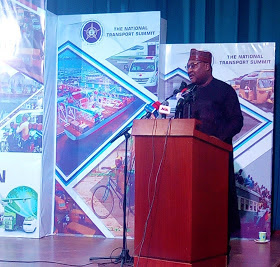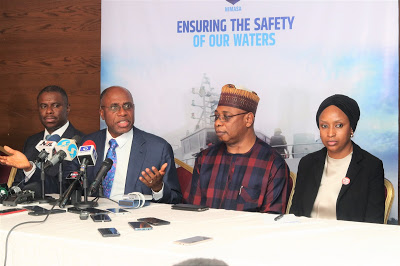…Says National Single Window to
come on stream
come on stream
 |
| File Photo: Executive Secretary, Nigerian Shippers’ Council, Mr. Hassan Bello |
The Nigerian Shippers’ Council at
the weekend said efforts have been ongoing among concerned agencies of government
to ensure improvement of service provision at the nation’s ports.
the weekend said efforts have been ongoing among concerned agencies of government
to ensure improvement of service provision at the nation’s ports.
The Executive Secretary of the
NSC, Mr. Hassan Bello, stated this on Saturday, while receiving a delegation of
the International Monetary Fund (IMF), assuring of efforts at improvement in
vessel dwell time at the ports.
NSC, Mr. Hassan Bello, stated this on Saturday, while receiving a delegation of
the International Monetary Fund (IMF), assuring of efforts at improvement in
vessel dwell time at the ports.
He also gave assurance that the
shippers’ council was working diligently with shipping companies to reduce
shipping cost.
shippers’ council was working diligently with shipping companies to reduce
shipping cost.
He said: “We are trying to build
first of all, a Port Community System so that we will have operational synergy
and then of course, National Single Window, which is the simplification of all
processes, we need to be open and transparent, we have to reduce the corruption
at the ports and we need to automate the ports for faster clearance of cargoes.”
first of all, a Port Community System so that we will have operational synergy
and then of course, National Single Window, which is the simplification of all
processes, we need to be open and transparent, we have to reduce the corruption
at the ports and we need to automate the ports for faster clearance of cargoes.”
“What we are doing now is about
18-20 days cargo dwell time, we want to reduce it to 7. The ship turnaround
time also is 4.1, we want to reduce it further, we want to attract more cargoes
here, not only for imports but also for exports and that is the whole issue.”
18-20 days cargo dwell time, we want to reduce it to 7. The ship turnaround
time also is 4.1, we want to reduce it further, we want to attract more cargoes
here, not only for imports but also for exports and that is the whole issue.”
“As we move to the ports, you
will see that we lack efficiency at the ports. The ports are private sector
driven, haven been concessioned about 12 years back to the private sector,
because we believe that the private sector should lead. However there are
logistics problems, one of which is infrastructure.”
will see that we lack efficiency at the ports. The ports are private sector
driven, haven been concessioned about 12 years back to the private sector,
because we believe that the private sector should lead. However there are
logistics problems, one of which is infrastructure.”
“The roads in and out of the port
is a challenge and the government is now working, constructing all the roads
leading to the ports. Besides, the government is also going to introduce rail
services into the ports, because the problems has been that we are using one
mode of transportation, the ports have been stretched beyond their capacity.
is a challenge and the government is now working, constructing all the roads
leading to the ports. Besides, the government is also going to introduce rail
services into the ports, because the problems has been that we are using one
mode of transportation, the ports have been stretched beyond their capacity.
“They are handling more cargoes
than their intended capacity, so we have short term, medium and long term
solutions for the ports.”
than their intended capacity, so we have short term, medium and long term
solutions for the ports.”
The IMF team led by Mr. Amine
Mati toured three terminals in Lagos ports, including APMT, Greenview and PTML
where they were taken round the facilities.
Mati toured three terminals in Lagos ports, including APMT, Greenview and PTML
where they were taken round the facilities.
Mati, Chief Mission, Senior
Representative for Nigeria Africa Department, who spoke to newsmen after the
inspection said the team was in the ports to find out the challenges,
priorities and necessary policies introduced by the federal government in the
area of trade facilitation.
Representative for Nigeria Africa Department, who spoke to newsmen after the
inspection said the team was in the ports to find out the challenges,
priorities and necessary policies introduced by the federal government in the
area of trade facilitation.
He said: “We were able to discuss the port congestion
and noted that the clearance time still remains challenging, we are trying to
determine the different policies and priorities put in place, particularly the
scanners, national single window is very important to accelerate the process, the
roads outside the port is also important for efficiency increase.
and noted that the clearance time still remains challenging, we are trying to
determine the different policies and priorities put in place, particularly the
scanners, national single window is very important to accelerate the process, the
roads outside the port is also important for efficiency increase.
“As trade is picking up, the port
is an important aspect of Nigerian economy, particularly in Lagos where the
activity is.
is an important aspect of Nigerian economy, particularly in Lagos where the
activity is.
“The Nigerian port is challenging
as the stakeholders and agencies are recognising, some of the challenges remain
the logistics, the scanners, the single window clearance process, all needs to
be accelerated so that goods can be discharged quickly.
as the stakeholders and agencies are recognising, some of the challenges remain
the logistics, the scanners, the single window clearance process, all needs to
be accelerated so that goods can be discharged quickly.
“This is part of our field visit,
we carry out annual checkup of the economy to determine the performance and
challenges.”
we carry out annual checkup of the economy to determine the performance and
challenges.”
According to Mati, the team would
also be meetings with the government and the private sectors operators, after
which it would publish its report after March 30th.
also be meetings with the government and the private sectors operators, after
which it would publish its report after March 30th.

































































